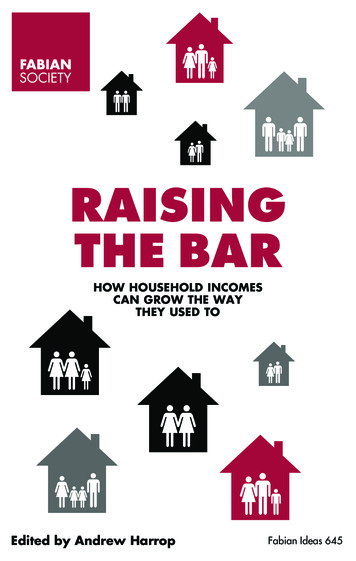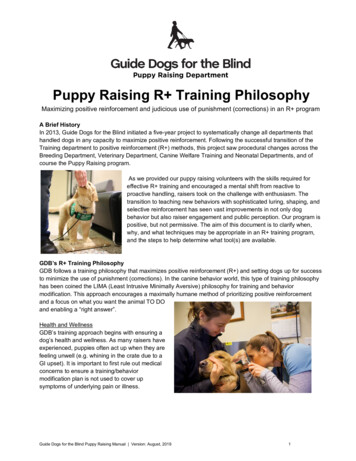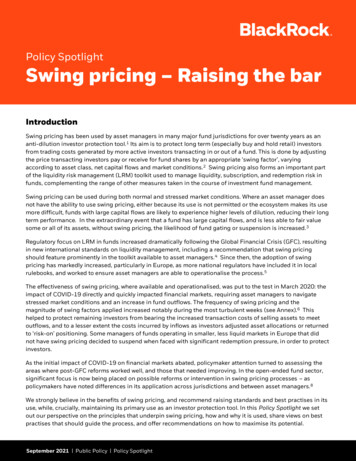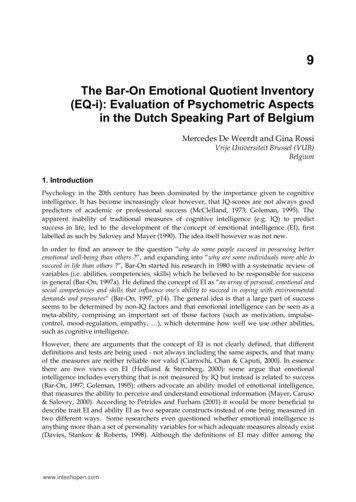
Transcription
RAISINGTHE BARHOW HOUSEHOLD INCOMESCAN GROW THE WAYTHEY USED TOEdited by Andrew HarropFabian Ideas 645
The Fabian Society gratefully acknowledges the financialsupport received for this project from the John MillsCharitable Trust and the Dartmouth Street Trust.
The Fabian Society is Britain’s oldest political think tank. Since1884 the society has played a central role in developing politicalideas and public policy on the left.Through a wide range of publications and events the societyinfluences political and public thinking, but also providesa space for broad and open-minded debate, drawing onan unrivalled external network and its own expert researchand analysis.The society is alone among think tanks in beinga democratically-constituted membership organisation,with over 7,000 members. During its history the membershiphas included many of the key thinkers on the British leftand every Labour prime minister. Today it counts over 200parliamentarians in its number. Member-led activity includes70 local Fabian societies, the Scottish and Welsh Fabians,the Fabian Women’s Network and the Young Fabians, whichis itself the leading organisation on the left for young peopleto debate and influence political ideas.The society was one of the original founders of theLabour party and is constitutionally affiliated to the party.It is however editorially, organisationally and financiallyindependent and works with a wide range of partnersof all political persuasions and none.
Fabian Society61 Petty FranceLondon SW1H 9EUwww.fabians.org.ukFabian Ideas 645First published April 2018ISBN 978-0-7163-0645-0Editorial director: Kate MurrayThis pamphlet, like all publications of the Fabian Society,represents not the collective views of the society but only theviews of the authors. The responsibility of the society is limitedto approving its publications as worthy of consideration withinthe Labour movement. This publication may not be reproducedwithout express permission of the Fabian Society. The Fabian Society 2018The moral rights of the author have been asserted.British Library Cataloguing in Publication data. A cataloguerecord for this book is available from the British Library.Printed and bound by DG3, London, UKTo find out more about the Fabian Society, the YoungFabians, the Fabian Women’s Network and our localsocieties, please visit our website at www.fabians.org.uk
Raising the barHow household incomes can grow the way they used toEdited by Andrew Harrop
About the authorsTorsten Bell is director of the Resolution Foundation.Dustin Benton is policy director at Green Alliance.Craig Berry is reader in political economy at theFuture Economies Research Centre, ManchesterMetropolitan University.Anneliese Dodds is Labour MP for Oxford East anda shadow Treasury minister.Alexander Guschanski is a researcher at the GreenwichPolitical Economy Research Centre, University of Greenwich.Andrew Harrop is general secretary of the Fabian Society.John Mills is founder and chairman of JMLand an economic commentator.Özlem Onaran is professor of economics at the Universityof Greenwich and the director of the Greenwich PoliticalEconomy Research Centre.Chi Onwurah is Labour MP for Newcastle upon TyneCentral and shadow minister for industrial strategy, scienceand innovation.Rachel Reeves is Labour MP for Leeds West and chair of thebusiness, energy and industrial strategy select committee.Geoff Tily is senior economist at the TUC.
CONTENTSIntroduction11: A national mission92: Catching up153: The everyday economy254: Building on success335: Win-win456: Too high a price557: Reversing austerity65Andrew HarropChi OnwurahCraig BerryRachel ReevesTorsten BellÖzlem Onaran and Alexander GuschanskiJohn MillsGeoff Tily
8: Tax and social justice759: Green and growing83Endnotes91Anneliese DoddsDustin Benton
INTRODUCTIONAndrew HarropFour years ago, a Fabian report argued that GDP shouldno longer be the main measure of national economicsuccess. Instead we should judge our economy by thepace at which ordinary household incomes rise; after all,the point of economic growth is to place prosperity into thehands of the people.Judged by this benchmark, the UK’s recent economicrecord is truly terrible. Before the financial crisis, medianhousehold incomes used to grow on average by more than2 per cent a year. This was not a short-term phenomenonlinked to a fragile pre-crisis economy. It was the long-termBritish trend, seen ever since the Second World War. Bycontrast, after the financial crisis, family incomes have barelygrown at all. The real incomes of working-age householdsare only just higher than those of 2007.So how can we get family incomes to grow the way theyused to? That is the simple question the Fabian Society posedto the authors of this pamphlet. We wanted to understandwhat it might take to get back to the ‘old normal’ – theregular rising income that half a generation of workershave never seen. In doing this, our aim has been to take onthe sense of fatalism that has overtaken Britain’s economicdebate, to prove that the UK does not have to settle for thegrowth we have.1
Raising the barRight now it feels like the pillars of the economic establishment are planning for stagnation. The Bank of England andthe Office for Budget Responsibility base their forecasts onthe assumption that real wages will barely rise. Their mostrecent projections imply that median earnings will not reachtheir 2007 levels until well into the 2020s. And we’re now inthe extraordinary position where the economy is believedto be ‘over-heating’, to the extent that interest rate rises arerequired, even though household incomes are barely rising.And because of these projections, the Conservatives havenot finished with austerity. They are still planning big cutsto social security, which will further reduce the incomes ofthe bottom half and hugely increase child poverty over thenext five years. It is important to remember that, while earnings are the most important component of family incomes, ifwages are rising while benefits are falling, living standardswill be held back.Cuts to benefits and tax credits have a direct impact onhousehold incomes. But cuts in public services and investment have also had a terrible impact on households, bysuppressing growth in GDP and earnings. In his chapterGeoff Tily makes a compelling case for ending austerityand raising public spending for the sake of growth. Heshows that stimulating demand through public spendingwill lead to higher hourly earnings and productivity. Andsince this will lead economists to re-assess whether theeconomy is at full capacity, Tily argues that interest ratesshould not be raised until there is evidence of domestically-induced inflation.There are other macro-economic proposals in the reporttoo. Özlem Onaran and Alexander Gushanski demonstratethat less inequality will lead to higher, more stable growth.Action on inequality is a win/win for family incomes,because it grows the size of the economic pie and the share of2
Introductionit that low and middle-income households receive. They offera comprehensive list of actions to narrow the income gap.Meanwhile John Mills argues that the economy will not beable to grow fast again until the UK has a larger manufacturing sector and can reduce its huge trade deficit. He proposesa managed exchange rate to deliver a permanent and credible devaluation that will give businesses the certainty toinvest. The possible long-term benefits of devaluation needto be balanced against the short-term disadvantage of inflation, however. In his contribution Torsten Bell explains howeconomic shocks that caused inflation have been rapidlytransmitted into lower real wages because we have a flexiblelabour market where workers are in a weak position to insiston higher pay.Bell is joined by Tily, Onaran and Gushanski, andby Rachel Reeves in arguing that a less flexible labourmarket is a strategy for income growth. Intervention to makemodern work less precarious and to boost workplace collectivism is needed to redress power imbalances and enableworkers to bargain for decent pay rises. This must be a priority for the left, not just for the sake of fairness but for ournational prosperity.Bell also argues for continued action in areas of recentprogress, namely tackling low pay and achieving fullemployment. The national living wage should be graduallyextended to younger age-groups and more action is neededto secure high employment for mothers (who could be putoff from working by universal credit), disabled people andthose in low-employment economies like Birmingham.More generally, sensitivity to place is essential if household incomes are to start growing again. Craig Berry sets outa comprehensive agenda for reducing regional inequalities,with calls for the fair geographic distribution of public investment, beefed-up powers of local and regional economic lead-3
Raising the barership, keeping public money within local economies, andsupporting stronger manufacturing supply chains.Rachel Reeves and Chi Onwurah also emphasise the needfor regionally balanced growth in discussing industrialstrategy. Reeves examines the ‘everyday economy’, thehigh-volume, low-paid jobs found everywhere. She calls fora national strategy for good work, linked to new sector dealsfor service sectors like retail and social care.Onwurah’s focus is on the economic sectors of the future.She argues for mission-oriented innovation where thepublic sector shapes and steers the economy’s development,through strategic investment and leadership. One missionshe identifies is to push towards a big rise in research anddevelopment spending and the percentage of high-skill jobs.Her other mission is to embrace green technologies and cleanenergy and this is the focus of Dustin Benton’s contribution.He argues that not only is green growth essential to meetour environmental obligations, it is also good for householdincomes because it raises business productivity, opens newexport markets and creates valuable mid-skill jobs.From cracking down down on zero-hours contracts toinvesting in the green economy, this is a wide-rangingagenda for raising earnings. These and many of the otherproposals are both the right actions to pursue in themselvesand good for living standards. But while it is correct tofocus on the primacy of boosting wages, we must not forgetthat the welfare state also has a vital role to play. The socialinfrastructure of strong public services and the income topups of redistributive social security are essential for familyprosperity too.In order to end austerity and reinvest in the welfare state,however, taxes will probably need to rise. These increasesmust be levied on those with the broadest shoulders, toensure they do not put a dent in ordinary post-tax incomes.4
IntroductionSo in her chapter Anneliese Dodds makes the case forrebalancing the tax system so that rich individuals andlarge companies pay more. It is the final component in thisprogressive agenda for getting household incomes to grow,just the way they used to.5
Raising the barA Fabian Society agenda for raisinghousehold incomesAcross the different chapters our contributors proposethese measures for raising household incomes:Fiscal and monetary policy: end austerity by stopping public spending from falling as a percentage ofGDP; increase public investment; only raise interestrates when there is evidence of domestically driveninflation; consider a managed exchange rate as part ofmonetary policy.Labour market reform: introduce a national ‘goodjobs’ strategy, as part of sector deals with low-payingindustries; increase the regulation of zero-hours andvariable-hours jobs; end tax incentives for employerswhich incentivise self-employment and very shorthours; increase and broaden the national living wageunless there is clear evidence of negative employmentimpacts; re-design universal credit to make work payfor mothers; increase support for disabled workers toretain jobs.Worker collectivism: increase powers for tradeunions including unimpeded access to workplacesand electronic balloting; introduce workers on boardsand sector-level partnerships between employers andunions; government support for new forms of collective organisation, especially for the self-employed, andfor alternative models of business ownership whichgive workers more control and reward.Regional policy: devolve strong economic powersto local and regional authorities; distribute publicinvestment fairly across the country; encourage public bodies and other local ‘anchor’ insti-6
Introductiontutions to spend their money locally and includeemployment conditions in procurement contracts;create a 10 Downing Street ‘local wealth unit’ to drivestronger local leadership capacity.Industrial strategy: design industrial strategy aroundnational missions; support manufacturing supply chaindevelopment; seek to significantly increase public andprivate R&D spending; maintain strong environmentalregulation and targets to promote world-leading greentechnologies; develop sectoral strategies for ‘everyday’jobs; establish a network of regional investment banks.Redistribution: rebalance the tax system to raisemore from rich individuals and large corporations;review all tax reliefs and allowances; end socialsecurity cuts.7
1: A NATIONAL MISSION: INDUSTRIAL STRATEGYFOR THE ECONOMY WE WANTChi OnwurahTo grow household incomes sustainably we need an industrialstrategy focused on delivering the future economy we want. Inplace of a financialised model which discourages productive investment, Britain requires a ‘mission-orientated industrial strategy’where government directs investment towards the growth opportunities of the future.In June last year, Labour might not have won the generalelection – but our message won hearts and minds acrossthe country. We were able to inspire people of all ages andalmost all backgrounds with a manifesto that offered hope.Off the back of this it’s estimated that we won a majority ofthe votes cast by under-45s, and matched the Conservativevote share among 45 to 54-year-olds.Our message was a positive one, but it was aided bya real sense that under the Conservatives the economy hasbeen moving backwards for ordinary people. The austerityagenda – what I call George Osborne’s zombie economics – has led to a crisis of social mobility and reduced theopportunities available to ordinary people. In the north-eastwe have felt this acutely: savage welfare cuts have led to40,000 people depending on Trussell Trust food banks eachyear while we have seen 40 per cent of our SureStart centresclose permanently.9
Raising the barAs a child growing up in Newcastle I benefited from agreat comprehensive school, an affordable council houseand a fantastic health service. That is how a poor, black,working-class girl could become a chartered engineer and,later, member of parliament for my home town. After eightyears of Conservative rule I worry that the same opportunities are not available to my constituents now – the impact ofausterity on public services is holding them back.But what is also holding them back is Conservative failureon the economy, with family incomes stagnant since thefinancial crisis. According to the ONS, the value of medianincome for non-retired households was 29,300 in 2017, only 100 per year higher than in 2008.The reality is that while the public sector has shrunk, oureconomy has failed to provide the jobs and wage growthpeople need. Today 3.8 million workers are in poverty acrossthe UK – that’s one in every eight – and 5.7 million are in jobsthat pay less than the (true) living wage. Real wages havefallen 10 per cent in the last years, a drop comparable only toGreece among the developed countries. In the north-east, theaverage worker is 4,000 per year poorer than 10 years ago.Longer term causesOsbornomics, which continues in a different guise under hissuccessor Philip Hammond, has been deeply damaging toour economy and to family incomes but it is nothing new.Since Margaret Thatcher, successive Conservative governments have been obsessed with cutting, deregulating andreducing the size of the state.I’m proud of what Labour did when in power to reverseand cushion these trends, and indeed it was in the 2000sunder a Labour government that we last saw a period of rapidand sustained growth in median household incomes. But10
A national missionwe failed to fundamentally change our country’s economicmodel and fully reverse the rollback of our public services.We were told that with the state out of the way, the privatesector would flourish. But what flourished instead is whatacademics and commentators call a ‘financialised’ economy – one dominated by market-based trading that createsprofits without producing anything. Since Thatcher’s ‘bigbang’ in 1986, the growth of finance has outstripped all otherUK sectors, and as a percentage of GDP our financial sectoris now larger than that of any other G7 economy.FinancialisationFinancialisation has been a big success for shareholdersand executives. But it has severely hampered our ability toproduce wealth collectively and prevented the rewards ofgrowth from being shared equally.Investment in real stuff is risky. It involves putting moneyinto costly productive capabilities that won’t necessarily befully utilised. Individuals, businesses, households and workers do this all the time. But the rules of our ultra-financialisedeconomy dictate that the only economic actors who shouldbe rewarded for the risks that they take are shareholders.Companies should therefore ‘maximise shareholder value’at all costs.And as world-leading economist Mariana Mazzucatoargues in her new book The Value of Everything, this focuson maximising shareholder value has two consequences –what she calls the ‘two faces of financialisation’. The first isthat the financial sector stops resourcing the risky businessof investing in ‘real stuff’. Instead it favours behaviours – forinstance share buybacks and financial engineering – thatline the pockets of shareholders but don’t necessarily add tothe productive capacity of the economy. Rather than invest-11
Raising the baring in companies which produce ‘stuff’, finance is financing finance. The second is the financialisation of the realeconomy, with industry driven by short-term returns whenit is financed at all. This results in less reinvestment of profitsand a rising burden of debt which, in a vicious cycle, makesindustry even more driven by short-term considerations.This kind of finance is not neutral but changes the natureof what it finances. It disincentivises the difficult, costly business of maintaining sunk assets like factories or developingnew technologies, instead encouraging strategies – such asoffshoring jobs – that neglect people and place but providean immediate financial return. This is partially reflected inour country’s low spending on research and development.Since the 1980s we have consistently been at or near thebottom of the league table of public and private R&D spendacross developed countries. And in moving away froma manufacturing-led economy, we’ve sacrificed a reliablesource of long-run wage growth.The solution – mission-oriented innovationTo fix our economy’s long-standing weaknesses and getfamily incomes growing like they used to, the governmentmust do more than stimulate the economy and redistribute wealth. We need to ensure that we have broad-basedeconomic growth in the first place – and we can do that withan industrial strategy based on a vision for the high-wage,high-skill, high-productivity economy that we want to build.The last 40 years have shown us that it matters wheregrowth comes from, as the absence of vibrant local economies destroys the fabric of communities, and damages quality of life. And, while the British economy needs to createvalue, it must create much more than just financial valuein the form of shareholder profit – there must also be social12
A national missionvalue through the creation of jobs, goods and services so thatwe can all live richer lives in a richer Britain.Mazzucato and Carlota Perez make a similar argumentwhen they say: “It is important to emphasise the distinctionbetween the potential of a technological revolution and thedirection of investment and innovation in which that potentialis deployed the direction chosen for using the new potential across the economy becomes a socio-political choice.”But what does setting a ‘direction’ mean in practice?Mazzucato advocates what she calls a ‘mission-orientedindustrial strategy’. This means the public sector makingstrategic investments, not to take the place of the privatesector but to encourage further investment from businessand to catalyse innovation.Investment is driven by business perceptions of where thefuture opportunities are for growth, and mission-orientedpolicies create these opportunities, bringing public andprivate sector investors together in pursuit of a sharedgoal. In its report on the Industrial Strategy Green Paper,the House of Commons Business, Energy and IndustrialStrategy Select Committee endorsed this approach, recommending: “A ‘mission-based’ approach, shaped by a visionas to the direction we want the economy to move towards,underpinned by a foundation of strong horizontal policies.”These recommendations were echoed by the non-partisanIndustrial Strategy Commission based at Manchester andSheffield Universities, and mission-oriented policies are alsobeing explored by the European Commission.Labour’s plansLabour’s industrial strategy is founded on these principles.We recognise that our country has great strengths we canbuild on: our world-class universities and extraordinary13
Raising the barheritage of scientific research, our booming creative industries; and our cutting-edge manufacturers, from ceramicsto steel and to automotive. A Labour government will takebold steps to make the most of these strengths and providesupport and investment where it is needed.This is a more strategic and coordinated approach thanwe have seen in recent decades but it is not old-fashionedcentralisation or command-and-control. It is about the statebringing workers and employers together with other stakeholders, and working with them in a way that is proactive,integrated, and long-term, drawing on best practices fromother countries to preserve our existing strengths and createfuture winners.Our approach is positive and practical. It speaks to thestudent anxious about his or her future, the single mumworking two minimum wage jobs, and the Redcar steelworker wanting a job to be proud of. It addresses the crisisin productivity, skills and wages which keeps us poor evenwith unemployment relatively low.We have set out two initial missions. First, to decarbonisethe economy with 60 per cent of our energy drawn fromrenewable sources by 2030. Second, to build an ‘innovationnation’ with 3 per cent of our GDP spent on research anddevelopment and the highest percentage of highly skilledjobs in the OECD.Achieving these missions will involve investment in skills,infrastructure and good, productive work. In government,Labour will take advantage of historically low interest ratesto borrow 250bn for infrastructure spending over 10 years.We will set up a network of regional investment banks acrossthe country. And we will create a National Education Service,allowing people to retrain throughout their lives. These arethe foundations upon which we will get the economy growing and ensure family incomes start to rise again.14
2: CATCHING UP: CLOSING THEREGIONAL INCOME DIVIDECraig BerryHousehold incomes are lower in Britain’s poorer regions and thegap has widened in recent decades. But attempts to address regionalinequalities since the financial crash still rely on pre-crisis thinking. We need to go much further – managing the economy strategically, devolving real power to the regions and spending fairlyon infrastructure – to bring growth to every part of Britain.The north-south divide, albeit loosely defined, haslong been part of the British pathos. The country’spolitical elite has, ostensibly, often sought to addressthe very real geographical inequalities which underpin thisrather simplistic trope. But the 2008 financial crisis led to anidentifiable gear-shift, as the divide began to feature heavilyin both elite and popular diagnoses of the crisis, and howBritain’s subsequent economic malaise might be addressed.Just because there is a will, however, it does not mean thereis (yet) a way. The notion of ‘rebalancing’ has framed elitediscourse since the crisis, in recognition of the economy’sover-dependence on growth in London and the southeast. But in suggesting that Britain’s economic model isfundamentally sound, but merely distended in some ways,rebalancing has not given rise to a suitably transformativepolicy agenda.Related discourses such as the northern powerhouse andmidlands engine are, at best, rather hollow – comically,15
Raising the baron 18 August 2016, Theresa May published near-identicalop-eds in The Yorkshire Post and The Birmingham Mailendorsing both agendas – and, at worst, quite infantilising.They put the emphasis on poorer regions needing to takeresponsibility for their own disadvantage, rather thanthe very longstanding political and economic inequalitiesthat characterise our economy and structure the relationship between regions. They also overlook the roles thatpoorer regions play in supporting prosperity elsewhere inthe economy.Lower household incomes in poorer regions are one ofthe main signifiers of Britain’s geographical inequalities.This inequality has worsened in recent decades, before andafter the crisis, as a result of various downward pressures onearnings. Manufacturing industries once sustained earningsaround the median point, but deindustrialisation – a processarguably dating back to the nineteenth century, but whichaccelerated from the 1980s – has hollowed out labourmarkets, particularly in the northern regions, the WestMidlands and Wales.The rise of low-value service industries has failed to fillthe earnings gap. These industries are more dependent onlocal consumption, rather than exports, and are thereforeheld back by sluggish local earnings growth, a self-reinforcing trend which creates a low-wage equilibrium in manylocal economies. Wages in services industries have beendriven further down by digitalisation, precarious employment practices and the consolidation of market share bykey firms.London and the south-east have not been immune fromthese trends. Just as we do not often enough consider thegeographical dimension of the earnings squeeze, we also tooquickly gloss over the fact that geographical differences inmany ways reflect class-based inequalities. These inequali-16
Catching upties are clearly evident in London and its hinterland – but asa whole these areas are more economically diverse.Key industries in London and the south-east are alsodeemed more strategically significant within the nationalgrowth model, and therefore receive extensive public sectorsupport. The growth of public sector employment in thenorth supported incomes in the 1990s and 2000s, but a reversal of this trend since 2010 has barely registered in Londonand the south-east.The international context is crucial here too. As financialmarkets synchronise and production networks internationalise, the global capitalist system has changed in character,with new core/periphery dynamics rendering the dividebetween developed and developing worlds highly anachronistic. The globalist capitalist core consists instead ofa network of large city-regions across the world.London is Britain’s only truly global city, due primarily tothe finance sector’s international significance, and how thisshapes the capital’s economy more generally. But whereaspolicy elites tend to present this apparent success story inisolation from the rest of the domestic economy, in realityLondon’s global city status is buttressed by the import ofhuman and financial resources from provincial regions, partof a dynamic some observers now refer to as a ‘finance curse’.Crucially, however, this process does not simply leaveBritain’s local economies starved of resources. It also offerssignificant power to London-centred firms, and their international partners, to reorder local economies for their ownbenefit. The way that outsourcing firms design contractsto extract value from local authorities, while leading thedeterioration of local labour market conditions, offers aninstructive example.In this context, Brexit is the last thing Britain’s disadvantaged regions need. One of the paradoxes of ‘globalisation’ is17
Raising the barthat trade has become more local: it is hard to trade servicesacross long distances, and goods trade increasingly consistsof components, via integrated production chains, rather thanfinished products.The ‘remainer’ left will get nowhere pretending that EUmembership has not buttressed London’s privileged status,due to the City’s entrepôt function for the Eurozone. Britaincould not have remained outside the Eurozone indefinitelyin these circumstances, and the European Commission’smoves towards establishing authority over certain City functions is a key factor behind elite support for Brexit.At the same time, however, single market and customsunion membership is vital for maintaining what is left ofBritain’s manufacturing capacity, since production processesare highly integrated across the continent. Yet the perennialweakness of British industrial policy means this capacity hasbecome concentrated in relatively isolated pockets of highvalue manufacturing activity, often dependent on overseasfirms, with limited integration with the local economies inwhich they are physically located.This dynamic lies behind the ‘left behind’ phenomenonin smaller urban an
Raising the bar ership, keeping public money within local economies, and supporting stronger manufacturing supply chains. Rachel Reeves and Chi Onwurah also emphasise the need for regionally balanced growth in discussing industrial strategy. Reeves examines the 'everyday economy', the high-volume, low-paid jobs found everywhere. She calls for










